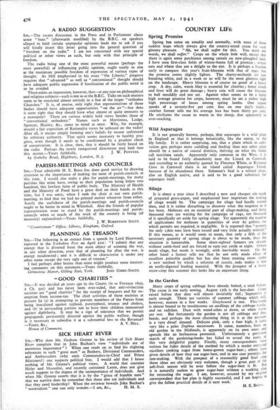A RADIO SUGGESTION SIR, —The recent discussion in the Press and
in Parliament about some " bans " (afterwards modified) by the B.B.C. on speakers alleged to hold certain unpopular opinions leads me to ask if you will kindly insert this letter going into the general question of " freedom on the radio." I am not concerned with any special political or other views as such, but only with that principle of freedom.
The radio being one of the most powerful means (perhaps the most powerful) of influencing public opinion, ought surely to aim at the maximum possible freedom of expression of various types of thought. As Mill emphasised in his essay " On Liberty," progress requires that " advanced " as well as " conventional " thought should have adequate public expression if fossilisation of the public mind is to be avoided.
There exists an impression, however, that—at any rate on philosophical and religious subjects—such is not so at the B.B.C. Talks on such matters seem to be restricted almost entirely to a few of the larger " orthodox Churches." It is, of course, only right that representatives of those bodies should have adequate opportunities " on the air "—but does it seem right that they should have what almost or quite amounts to a monopoly? There are various widely held views besides those of " conventional orthodoxy." Names such as Martineau, Lodge, Spencer, Huxley, &c., come to mind at once. Why, for example, should a fair exposition of Rationalist views be unheard on the radio?
After all, it means simply forming one's beliefs by reason unfettered by arbitrary authority. That spirit seems necessary to healthy pro- gress, even though it needs to be conditioned by a prudent check of conservatism. It is clear, then, that it should be fairly heard on the radio. Perhaps the newly reorganised directorate may look into






























 Previous page
Previous page